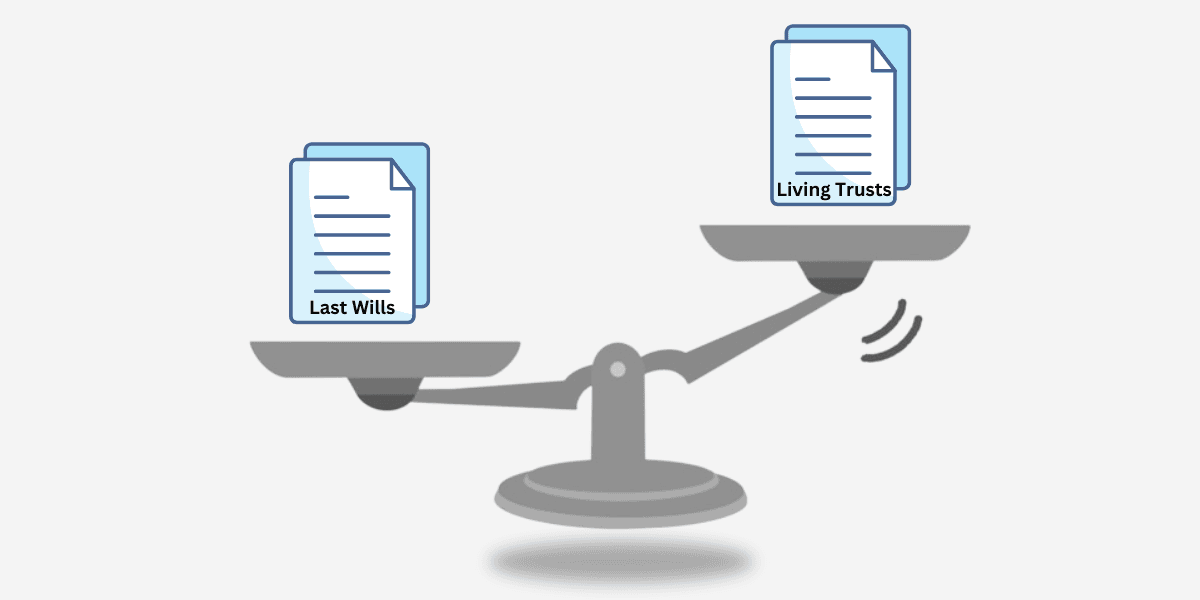
Deciding Between a Last Will and Testament and a Revocable Living Trust: A Guide for Floridians
Regarding estate planning in Florida, individuals have several options to ensure their assets are distributed according to their wishes. Trusts and wills are two of the most common florida estate planning tools. While they share the common goal of managing and distributing your assets, they differ significantly in their structure, purpose, and implementation.
Understanding the differences between these documents is crucial for making informed decisions about estate planning. Let's explore key components and considerations of these two legal instruments when planning for the future.
Last Will and Testament:
A florida last will, commonly known as a will, is a legal document that outlines how your assets and property should be distributed after you die. Your will can be a detailed document outlining your wishes or a generalized document. It is entirely up to you.
You can leave everything you own to a single designated beneficiary or distribute your multiple assets to numerous beneficiaries. Let’s say you own a car, a large sum of money, keepsakes, ancestral jewelry, valuable paintings and drawings, condos and houses, etc. As a Testator you get to choose one beneficiary or multiple beneficiaries for your asset distributions.
Having a last will is very important. You can include your physical properties such as your pets, house, vehicles, family heirlooms, and real estate and financial assets such as bank and investment accounts, bonds, and stocks. A last will also gives you the leverage to designate the legal guardian for your minor child.
Common Terms Used while Administrating a Last Will:
Florida Last Wills and Probate Process:
In Florida, a will must go through probate. It is a court-supervised process of authenticating the will, paying debts, and distributing assets to beneficiaries. This process can be time-consuming and costly, potentially delaying the distribution of assets to your intended heirs.
The delay can be due to estate complexity, disputes, and disagreements among the beneficiaries.
In addition to time delays, the execution of probate can also be expensive. Fees for court, lawyers, and other costs can quickly accumulate. This can reduce the final amount of the estate that beneficiaries receive.
Also depositing the last will and testament with the court ensures its authenticity and helps to prevent tampering or misplacement. This process is also referred to as "filing" or "registering" the will. By doing so, the court can verify the decedent's intent and ensure that their final wishes are respected. This step is especially important in Florida, as it helps to streamline the probate process and avoid potential disputes.
- Public Record: Wills become public records upon probate, meaning the terms of the will, as well as the assets and beneficiaries, can be accessed by anyone.
- Flexibility: Wills can be easily amended or revoked during the individual's lifetime, providing flexibility to accommodate changing circumstances or wishes.
Suggested Read:
Understandingwhen to deposit last will and testament in flroida probate court?
Pros and Cons of Last Wills:
Pros and Cons of Last Wills
Pros
- Ensures your wishes are honored
- Provides for your loved ones
- Minimizes family conflicts
- Reduces estate taxes
- Allows you to appoint guardians for minor children
Cons
- Can be complex and costly to create
- May be subject to challenges and contests
- Lacks flexibility for future changes
- Becomes part of the public record
- Involves a time-consuming probate process
Factors to Consider Before Creating a Will
When deciding whether to create a last will, it's essential to carefully consider your personal and financial circumstances, as well as your long-term goals and priorities. Some key factors to take into account include:
- Asset Ownership and Distribution: Evaluate the nature and value of your assets, and determine how you would like them to be distributed among your beneficiaries.
- Family Dynamics: Consider the potential impact of your will on your family members, and how it may affect their relationships and financial well-being.
- Tax Implications: Understand the potential tax implications of your estate plan, and explore strategies to minimize the tax burden on your beneficiaries.
- Guardianship for Minors: If you have minor children, carefully select the most suitable guardians to ensure their well-being and upbringing.
- Ongoing Flexibility: Assess your ability to make changes to your will over time, as your personal and financial circumstances may evolve.
Revocable Living Trust:
A Revocable Living Trust is another estate planning tool that allows individuals to transfer the ownership of their assets, such as real estate, investments, and personal property, into a trust during their lifetime with provisions for distribution upon death.
This trust is "revocable," meaning you can make amendments or even dissolve it entirely as the grantor (the person who creates the trust).
Overall a living trust can help streamline the distribution of assets after the grantor's passing, as the assets held in the trust are not subject to probate. This can help avoid the time and expense of the probate process, as well as provide privacy for the grantor and their beneficiaries. Most people often think that once they have created a living trust, they can relax. However, they fail to realize that funding a revocable living trustis equally important for safeguarding assets.
Common Terms Used while Administrating a Revocable Living Trust:
Here are the key features of a revocable living trust in Florida:
- Avoidance of Probate: Assets held in a revocable living trust bypass the probate process, resulting in faster distribution to beneficiaries and likely lower costs.
- Privacy: Unlike wills, revocable living trusts remain private documents and do not become part of the public record upon the individual's death, offering greater privacy for the settlor (the person creating the trust) and beneficiaries.
- Incapacity Planning: A revocable living trust can provide for the management of assets in the event of the settlor's incapacity, as a successor trustee can step in to manage trust assets without the need for court intervention.
- Continuity of Management: Since assets are held in the trust, there is no interruption in management or control of assets upon the settlor's death or incapacity, providing continuity and peace of mind.
Pros and Cons of Living Trusts:
Living Trust in Florida Pros and Cons
Pros
- Avoid Probate
- Maintain Control Over Assets
- Ensure Privacy
- Facilitate Incapacity Planning
Cons
- Cost of Establishment
- Ongoing Maintenance Required
- Potential for Mismanagement
- Limited Asset Protection
Factors to Consider When Deciding on a Revocable Living Trust
When deciding whether a revocable living trust is the right estate planning strategy for you, consider the following factors:
- Asset Complexity: If you have a complex estate with a variety of assets, a revocable living trust may be a more effective way to manage and distribute your assets.
- Privacy Concerns: If you value the privacy of your estate and the details of your asset distribution, a revocable living trust can help you keep these matters confidential.
- Incapacity Planning: If you're concerned about how your assets would be managed in the event of your incapacity, a revocable living trust can provide a solution.
- Cost Considerations: Weigh the upfront costs of establishing a revocable living trust against the potential long-term benefits, such as avoiding probate and maintaining control over your assets.
- Ongoing Commitment: Consider whether you're willing to devote the time and effort required to maintain a revocable living trust over the long term.
Trusts vs Wills Choosing the Right Option:
The decision between a Last Will and Testament and a Revocable Living Trust depends on various factors, including the size of the estate, the desire for privacy, the need for incapacity planning, the need for control beyond the grave, and personal preferences. Consulting with an experienced Florida estate planning attorney can help individuals assess their unique circumstances and determine the best estate planning strategy for their unique situation.
Conclusion:
Creating the appropriate estate plan for you and your loved ones is important, and choosing between Trusts vs wills in florida requires careful consideration of individual needs and goals. Whether you opt for a will or a trust, taking proactive steps to plan for the future can create peace of mind and ensure your assets are distributed according to your wishes.
In Florida, where estate planning laws and procedures may differ from other states,consulting with a knowledgeable estate planning attorneycan provide invaluable guidance and assistance in creating an effective estate plan tailored to your specific needs.

